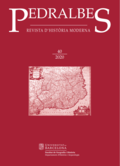Mediterranean transformations: From the security of mercantilist trading empires to a modern security regime.
DOI:
https://doi.org/10.1344/PEDRALBES.40.12Keywords:
Jeremy Bentham, Benjamin Constant, Chateaubriand, Alexis de Tocqueville, Adamantios Korais, French invasion of Algeria, Greek independence, Ottoman Empire, Congress of Vienna (1815).Abstract
In early modern times, European international relationships with the Ottoman Empire and in the Mediterranean were characterized by a complex system of consular networks privileged by the sultan or the North-African deys and beys by way of capitulations. Security was mostly addressed in terms of safety for the free practice of trade and commerce. The transformation of this situation between the late eighteenth century until around 1840 is characterized by complex entanglements of continuity and rupture between early modern and modern realities: the infrastructure of the consular system persisted for a long time, while the invasion of Egypt (1797), the continental Napoleonic Wars, the Greek War of Independence (starting 1822) and the invasion of Algeria (1830) were profoundly changing the region. «Security», as conceived by liberal men of politics like Chateaubriand, Benjamin Constant and Jeremy Bentham, became a central term to order the emerging new realities in terms of state and international politics. At the same time, while one conceives of the European allies’ invasion of Greece as perhaps the first modern humanitarian intervention, more or less the same type of military intervention in Algeria is conceived of as France’s first modern act of colonization by military forces. This dialectic of the two-sided face of interventionism under different labels as an exception from the rules of the post-Vienna system of international relations was producing new conceptions of security in and of the Mediterranean.
Downloads
Published
How to Cite
Issue
Section
License
Copyright (c) 2020 Cornel Zwierlein

This work is licensed under a Creative Commons Attribution-ShareAlike 4.0 International License.
Authors must agree with the following terms:
1. The author keeps authorship rights, ceding the journal the right to first publication.
2. Texts will be disseminated with a Creative Commons Attribution 4.0 International License. Which allows for the work to be shared with third parties, as long as they recognise the work’s authorship, the original publication in the journal and licensing conditions.
This requires acknowledging authorship appropriately, providing a link to the license, and indicating if any changes have been made. It can be indicated in any reasonable way, but not in a manner that suggests the licensor endorses or sponsors the use of the text.
If content is remixed, transformed, or new content is created from the journal's texts, it must be distributed under the same license as the original text



